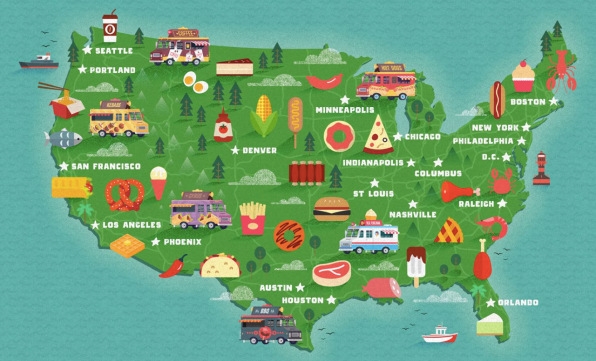You can get just about any food from a truck these days: souvlaki, Mexican-Korean BBQ, every imaginable meat pie. The modern food truck economy, which sprang into life in the late-2000s, keeps growing and is now thought to be worth some $2.7 billion a year.
You would think that setting up a food truck is an easy way into the food business. Food trucks are often considered as stepping stones for would-be chefs: After they’ve proved their skills to the street, they can graduate to opening a more permanent location. But setting up and operating a truck often isn’t always that easy, a new report says. Many cities place onerous regulations and operating costs on truck owners, stifling what could be a bigger industry.

Boston charges more than $17,000 to start a food truck, then $37,000 a year in annual operating costs related to regulation (mostly zoning fees). You need to install a GPS system from an approved vendor ($299) and pay a monthly data charge ($35)–just to prove you’re where you’re supposed to be. Minneapolis mandates that trucks can’t be closer than 500 feet from stadiums or festivals. West Hollywood requires trucks to move streets every hour.
Food trucks, I believe, are a symbol of regulatory inequality across the economy.
There is a growing gulf between how government regulates the sort of entrepreneurship most accessible to the educated and wealthy, and how it governs entrepreneurship most accessible to the poor.
— Michael Hendrix (@michael_hendrix) March 21, 2018
The Chamber of Commerce Foundation, which produced the report, sees these regulations as a microcosm of the challenges faced by many small businesses. Entrepreneurs are just trying to get ahead, and then along comes government to make things more difficult than they need to be, it says.
“Food trucks are a cultural asset that help cities thrive,” says Carolyn Cawley, president of the foundation. “They are run by creative people. Their food is a labor of love. We just want it be more love than labor.”
The report ranks 20 cities for ease of doing food truck business. Boston, which requires 32 procedural steps before opening a truck, comes last in the index. Denver, which comes second, requires only 10 procedures to obtain permits and licenses.

Portland, Oregon, is the easiest city to start and operate a truck, according to the report, which looks at regulations, restrictions and ongoing costs. Orlando and Philadelphia are also seen as relatively easy, while San Francisco and Washington, D.C., are at the other end of the scale.
The variation in regulations points to their arbitrary nature, Cawley says. Food truck owners in Boston pay nearly 29 times more in fees than those in Indianapolis, for example. Sometimes the regulations appear to arise more to protect established businesses–like vendors at sports stadiums–than to protect citizens from harm, for instance from food poisoning or unwanted odors and noise.
“Food trucks are largely an immigrant story. For a lot of people, it could be a pathway to starting a business. We believe it could be a better on-ramp in many places,” Cawley says.
(29)